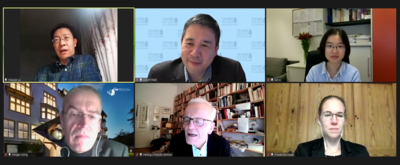International economic cooperation: From China's Belt and Road Initiative (BRI) to the G7's Build Back Better World (B3W)
The third day of China Week was dedicated to international cooperation in business and was moderated by PD Dr. habil. Friederike Paetz, who has been the academic director of the Clausthal Executive School since October 2021.
The audience on this day is also international, with over 50 participants from all over Germany and China. The event begins with a lecture by Prof. Dr. Miaojie YU from Peking University on the Chinese economy, taking into account an era of new development patterns. Although the global economy is in a state of shock due to the coronavirus pandemic, which is also influenced by global challenges such as demographic change and climate change, the Chinese economy was able to record high economic growth in 2020 and 2021. He identifies six characteristics for this development, including high-quality product development. In order to increase economic growth in less developed regions and countries, the Chinese government is focusing on the Belt and Road Initiative (BRI), which Prof. Dr. Holger Görg examines from a geo-economic perspective. In a study, he was able to determine a positive effect on the exports of the BRI partner states. In response to the question from PD Dr. habil. Paetz whether the "boost" in trade within the framework of the BRI can be attributed to certain products, possibly in the technology sector, he replied that it is likely that individual companies benefit more than others. These are probably companies that produce capital goods that are needed for the infrastructure. Nevertheless, Prof. Dr. Hou noted that many people are sceptical about the BRI, which Prof. Dr. Görg explained with concerns about China's growing political influence. This is followed by the third contribution by Prof. Dr. Albert Francis Park from the Hong Kong University of Science and Technology, who analyzes the BRI with facts and evidence from a Chinese perspective and addresses both the optimists' and the sceptics' arguments. It shows that investment recipient countries do not necessarily have a better view of China. The anti-China trend persists and the general sentiment towards China remains constant. In addition, a negative correlation between the perception of China and the amount of investment made can be demonstrated, further emphasizing the need for events such as China Week. Finally, Prof. Dr. Lei LI takes a look at the USA and attempts to explain the trade dispute between the USA and China using empirical data. The strategy pursued by Trump of imposing customs duties on Chinese technology products has not worked. Instead, domestic innovations in particular are being promoted, which is also benefiting Chinese R&D. At the same time, investment in R&D in the USA is declining and the focus is increasingly on Western cooperation, e.g. with the EU or Japan and South Korea. After a short coffee break with background music, which was praised by the Chinese participants as "great innovation" in the sense of live entertainment during a Zoom meeting, a presentation by Prof. Dr. Helwig Schmidt-Glintzer from the University of Tübingen followed. The focus here is on the responsibility of science and business in a networked world, which plays a central role, especially during the coronavirus-related contact restrictions. Mutual understanding is important for international cooperation, and it has taken a long time for China to be perceived as a rising power. What future cooperation will look like and who will lead it is therefore of central interest. Trust, which was already mentioned several times on Monday, also plays a role here - because this is the only way to benefit from each other. He ended his presentation with a quote from Fabian Heubel, who said: "It has to become difficult to define what it means to be a European [...] one way to become European is to become Chinese."
All the speakers during the day conclude with a discussion on the topic: Belt and Road Initiative vs. It was agreed that the B3W initiative initiated by the G7 countries should be seen as a reaction to the BRI and would not exist without it. Prof. Dr. Hou, who thanked everyone involved at the end of the discussion, would like to see more win-win situations for everyone, because 不管黑猫还是白猫,抓住老鼠就是好猫 (It doesn't matter whether the cat is white or black. The most important point is the cat catches mouses).
Video link: https: //video.tu-clausthal.de/film/china-woche-2021_1228.html
Photo link: HERE

